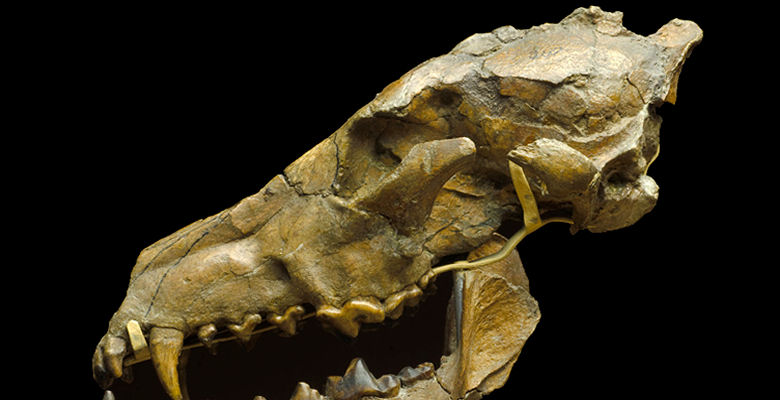Human-altered ecosystems

By studying these prehistoric dogs, we can understand how species today might need support in human-altered ecosystems.Image: Fossil dog housed in University of Florence Museum of Natural History (Geology and Paleontology Section). The dog is named Canis arnensis (fossil aged c.ca 1.9 Ma, common named as Arno dog – a species related to the extant coyote) from Valdarno basin (Tuscany). Photo credits: Saulo Bambi, Natural History Museum, University of Florence.
Dr Meloro talks about the importance of this research to conservation:
“We are living in a period of unpredictable climatic changes that animal and plant communities are dealing with. Understanding ecology and feeding behaviour of fossil organisms is the only way we have to predict species’ responses to climate change, and fossils are at the bulk of this research.
“Wild canids such as wolves and golden jackals are currently recolonising Europe and it is important to understand their evolutionary history in order to predict their impact on human-altered ecosystems.
“At the beginning of the Ice Age (c.ca 2.0 million years ago) three species of wild dogs were roaming free all over Europe together with other extinct large predators such as large hyenas and saber cats. Those species suddenly disappeared after the end of the Ice Age, while the wild dogs evolved into modern species including our favourite companion: the dog (Canis familiaris).
“Consequently, clarifying aspects of their prehistoric life will shed light not only on how species cope with climate change but also on our own relationship with the wilderness and with the dogs.”
The long bone study focused on the radius (that together with the ulna is part of vertebrate’s forearm) and is currently available open access in the journal Acta Palaeontologica Polonica. Dr Meloro worked with co-author Dr Julien Louys of the Australian National University on this study.
Dr Julien Louys commented:
“We highlighted the importance of including fragmentary fossils to interpret prehistoric environments. We were thrilled by the amount of information we could get from few fragments. This fragmentary material was preliminary interpreted by palaeontologists as belonging to the black-backed jackal ancestor. Jackals evolved alongside with early humans although their evolution is quite puzzling. We have three jackal species living together in East Africa but it still unclear if they all evolved from a single or from multiple fossil ancestors. Our work suggests that jackal remains from East Africa resemble –at least in the long bone- the golden jackal: a species that managed to successfully colonise also Europe and Asia.”
In a companion study published in the Journal of Zoology, Dr Meloro, with the collaboration of former LJMU undergraduate Angela Hudson and Italian palaeontologist Professor Lorenzo Rook (University of Florence), demonstrated that the size and shape of skull anterior portion is strongly informative of feeding behaviour in extant and fossil dogs.
Dr Meloro commented:
“By using 2D digital photography we were able to capture size and shape of extant and fossil wild dog skulls. This publication developed thanks to the commitment of LJMU undergraduate Angela Hudson that undertook several statistical analyses during her final year research project. We finally revealed feeding behaviour of many enigmatic fossil specimens from Europe."
Now and LJMU graduate, Angela Hudson said: ”It was very important for my professional development to realise that part of my undergraduate work can become a publication. I quite enjoyed my final year research project at LJMU and once Dr Meloro proposed me to continue working on it for publishing the results, I was thrilled. It took an extra effort but definitely worth it. I am very proud of being part of this publication. I definitely realised that hard work pay in the end."
Following this research, Dr Meloro will be exploring new techniques such as microwear tooth analyses in collaboration with the General Engineering Research Institute (GERI) at LJMU involving both students and researchers.


